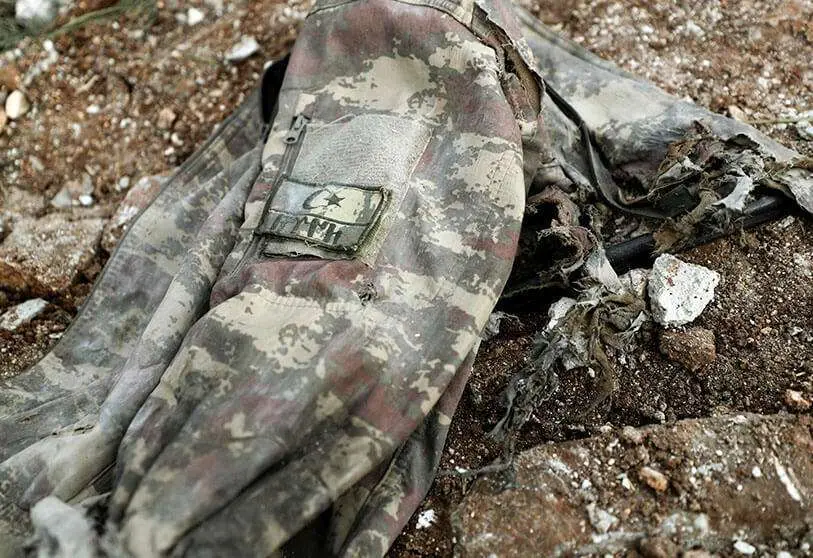Erdogan accused of covering up the deaths of Turkish soldiers in Syria and Libya

Turkish president Recep Tayyip Erdogan has covered up the deaths of Turkish Army soldiers in the fighting in Syria and Libya, where there have been numerous military casualties. This was reported by the spokesman for the Turkish Republican People's Party (CHP), Faik Öztrak, at a press conference.
In the first case, the deaths of members of the Turkish Armed Forces are counted in the dozens, especially after the attack on Idlib on 28 February by the Syrian Arab Army, which killed at least 33 Turkish soldiers. Thirty-five were injured. At the beginning of the month, another offensive by Syrian troops in the north-west of the country resulted in eight deaths of Turkish nationals, including seven soldiers and one civilian.
In the second case, the leader of the Eurasian nation has only acknowledged two casualties among its ranks in Libya, which happened on 25 February, in an unusual gesture in which he admitted, for the first time, the presence of his armed forces in the North African country. A month earlier, two Turkish warships, named Gaziantep and Qediz, had arrived in the port of the Libyan capital, Tripoli, a stronghold of the Government of National Unity (GNA), led by Prime Minister Fayez Sarraj and sponsored by the UN. The ships were loaded with both military equipment and soldiers, local sources said at the time. However, the exact number of Turkish troops in Libya is still unknown.

“The Turkish regime does not wish to make public any news about the soldiers killed in Syria and Libya and therefore intimidates those who break this objective by waving the stick of the judiciary and imprisonment,” the opposition politician said, in an explicit reference to journalists who have been arrested in recent weeks for reporting on cases of soldiers killed in those countries.
On Sunday, a court in Istanbul issued arrest warrants for three news workers, namely Murat Agirel, a columnist for the Yenicag Daily newspaper, and Ferhat Celik and Aydin Keser, the editor-in-chief of the Yeni Yasam publication. Their crime, according to the judicial authorities, was to provide news about the funeral of a high-ranking Turkish intelligence officer who was killed in Libya, as well as to reveal his identity.
Two days earlier, on Friday, two other journalists were arrested: Baris Terkoglu, news director of OdaTV, and Hulya Kilic, a reporter for the network. They were also accused of broadcasting images of the funeral, which was held in Manisa province on 2 March in a “silent” manner, without any military ceremony or honours. The court also ordered that the television station be closed.

According to the Prosecutor's Office, which has ordered the arrests, “the journalists revealed information about intelligence activities and documents that put the families, relatives and colleagues of the intelligence officers in danger”. However, as explained by the media's Balkan Insight, the name of the deceased officer was previously disclosed at a session of the Turkish legislative chamber by the opposition deputy Ümit Özdağ: “The Turkish army has been involved in an Arab civil war 2,000 kilometres from Libya and is still in conflict. Two intelligence officers from our National Intelligence Service (MIT) were shot in a port next to a ship in Libya trying to bomb the port. Our soldiers and intelligence officers who clashed in the camp continue to pay for the misguided policies pursued by the palace regime,” he told Parliament on 26 February.
Similarly, on 29 February, Turkish police arrested at least four media workers - Idris Salygan and Nacy Kaya of the Pro-Kurdish Mezopotamia News Agency; Rawin Sterk, a reporter; and Mehmet Sirin Akgun, a camera operator from Rudaw - who were covering the movements of Syrian refugees across the country for “filming in a prohibited area”.
On the same day, freelance journalist Tuba Demir reported on her Twitter account that at least 20 colleagues had been arrested in Edirne, very close to the border with Bulgaria and Greece. Among them were four unidentified employees of the Russian media Sputnik, including the Turkish editor, who were released a day later.

All the media workers who have been arrested over the past week are known to be critical of the Erdogan Government, which has given rise to the idea that they have been arrested simply for political reasons.
“The hunt for critical media undertaken by Ankara culminated in the attempted coup d'état of July 2016. The authorities closed down dozens of media outlets. A holding company close to the government bought the largest Turkish press group. The siege continues to tighten around what remains of pluralism: a handful of low-run publications that survive amidst harassment by the authorities,” Reporters Without Borders said. It should be recalled that 70 newspapers, 20 magazines, 34 radio stations and 33 TV stations have been closed down in the past four years.
According to the organisation's overall ranking, which measures the quality of press freedom, Turkey is 157th out of 180 countries registered. Russia, Iraq and Venezuela, for example, all score better.

According to the organisation, 22 journalists are currently imprisoned in the Eurasian nation. This figure, however, does not include those in which media professionals were arrested for reasons unrelated to their profession or those in which it has not yet been possible to verify that there was a connection with their work. Other sources such as the Committee to Protect Journalists (CPJ) put the number of detainees at 47, while Balkan Insight has documented that up to 84 journalists are currently behind bars in Turkey.
“Spending more than a year in detention until trial has become the norm for journalists who, when sentenced, can be sentenced to life in prison without understanding why,” RWB warns. “Turkey is once again the world's biggest prison for media professionals,” the organisation said.








